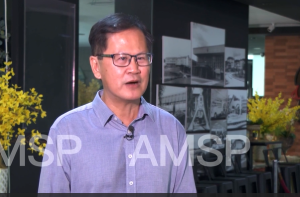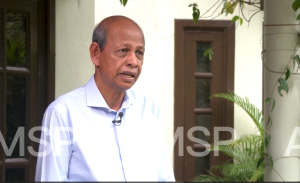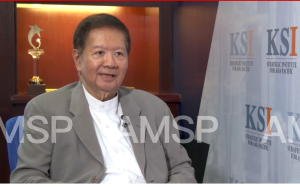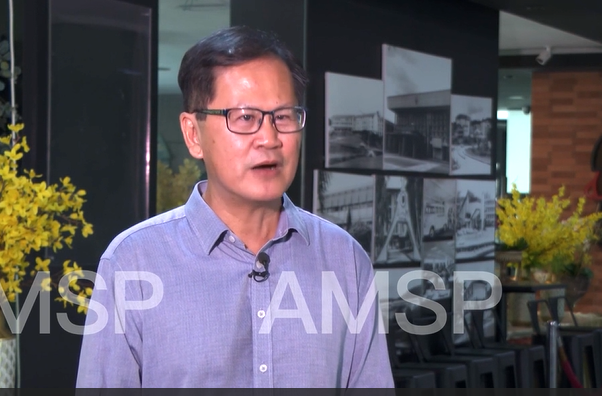October 2nd (AMSP/CGTN) – – On the occasion of the 75th anniversary of the founding of the People’s Republic of China (PRC), some persons in authority have congratulated China and expressed their opinions on China’s achievements during the past 75 years, through interviews by CGTN in Malaysia.
These include Peter TC Chang Former deputy director of the Institute of China Studies, University of Malaya; Abdul Majid Khan, former Malaysian ambassador to China and former chairman of Malaysian Investment Development Authority; and Michael Yeoh, president of KSI Strategic Institute for Asia Pacific
For his part, Peter TC Chang pointed out that celebrating the 75th anniversary of the PRC is a milestone for the country. It has achieved a great deal especially in the last three decades, after the opening of a reform. “China’s remarkable economic sort of transformation is truly historic. We have never really seen it being 1.3 billion people population lifted out of poverty to middle class and upper middle class. It’s a remarkable achievement,” he underscored.

“To that, I think we have to give the Chinese the credit for accomplishing this remarkable feat and it’s been an inspiration for us in the developing world. And China has told us that if they can do it, we can do it as well. The country’s economic development has been an inspiration to all of us in the global South. So, we should be able to enjoy the China dream in our own Malaysian way, or southeast,” he added, congratulating China for its 75th anniversary.
Geopolitically, Peter TC Chang pointed out that the two different centuries are going through a transition. “Right now, we have seen the 20th century as a Western sort of led Global Order, which has benefited a lot of us. But we are seeing the move right now from the Westerns-led to a more pluralistic, more inclusive, sort of leadership, a global leadership that is more representative of the global community. And China is taking that lead,” he said.
“China is eventually going to the extent that it is taking their lead. What we are seeing right now is a kind of a Global Leadership that is more representative, especially for us in the Global South. We felt that Global South right now, leaders in the developing world would want to have a stronger voice in shaping the global narrative,” he added, stressing that through China’s leadership, BRICS, BRI (Belt and Road Initiative), RCEP (Regional Comprehensive Economic Partnership) and the Shanghai Cooperation and others that China has led, it’s beginning to put into the building blocks, into this new world order that we see, a world order that is more inclusive and pluralistic.
In the same chapter of China’s achievements, former Malaysian ambassador to China Abdul Majid Khan said that in the last 75 years, China has recorded a remarkable achievement in many areas. It has transformed itself from an agrarian country to a modernized socialist state with global influence.
“And today China has had a great impact all over the world in terms of achievement specifically, China’s alleviation of poverty, the raising of standards of living of the people followed by the ability to actually achieve great success in digitalization in terms of EV (Electric Vehicles), and AI (Artificial Intelligence). And this year, China has been the largest exporter country of automobile. These are remarkable achievements and I think, you know, we should appreciate and congratulate the people in China for these achievements,” he told CGTN.

Additionally, Abdul Majid Khan disclosed that China’s opening up to the world has great impact on Malaysia. “In fact, Malaysia was one of the first countries to respond to this open-door policy and we have taken advantage of the opportunities that we laid the foundation for increasing trade and investment between China and later on this was followed by a greater flow of People-to-people exchanges. We also gained through the export of China technology, expertise, capital into Malaysia,” he noted, expressing his hope that China can contribute a lot to Malaysia’s own transformation development, in terms of Industrial Development, infrastructure development as well as in the issue of technology.
He also recalled the three initiatives recently put forward by China. “I think China has come up with three Global initiatives: The global development initiative, the security development initiative and the civilization dialogue initiative. These are good public goods or policies that could actually bring about a more balanced world order, a more just World Order, and also perhaps could also achieve what we wish to have: a community of shared future,” he said.
Regarding win-win situation, former Malaysian ambassador to China Abdul Majid Khan pointed out that overall China has not only gained for itself. “I think China’s rise and development have benefited the world in many ways. I think, first in terms of sharing the prosperity of China through investment, through trade and for a country like Malaysia apart from this, we also gained through the flow of tourism, education, and also perhaps, now we are looking at how we can leverage on the training of Human Resources,” he clarified, adding that Malaysia needs a lot of specialists, skilled talent, while believing that this is an area that China can contribute much to a country like Malaysia.
For his part, Michael Yeoh, President of KSI Strategic Institute for Asia Pacific underscored that China has done so well. “I think it is the miracle to say that China has itself in the last 75 years. Its poverty eradication is beyond any comparison in the world,” he disclosed.
He added that what really impressed him with the tremendous transformation in China are two things. He pointed out that the first thing is China’s urbanization. “30, 40 years ago, when we first went to China, there were a lot of rural communities. I remember being taken to one of the central areas in Shanghai, which was still quite dilapidated and today has become very bustling metropolis of Pudong. And I can see the comparison there and as we’ve seen a lot of the urbanization in China growing in many other cities, including Inland cities. So, that is a one big impression on me that we can learn from China’s rapid urban development,” he explicated.

According to him, the second big impression that he has seen in recent years is technology and innovation. “I think China is now leading the world in green energy, it’s been a leader in digital technology, and I think these are areas that Malaysia and the region can learn from and benefit from China,” he highlighted.
Furthermore, Michael Yeoh acknowledged that China has always been a key partner of Malaysia. “China is our largest trading partner and we have got very, very good political relations with China as well,” he revealed, hoping that the continuation of those good bilateral relations would benefit both countries and also help Malaysia bring in more tourists, more investments, more trade with China.
He pointed out that China’s participation in infrastructure development in the region would be good, beneficial for Malaysia and also for the ASEAN countries. “We see also Chinese investments in ports and Railways in Cambodia, Laos, Indonesia, and all of these, all benefit ASEAN,” he said.
“Malaysia can learn from China’s technological leap. It has leapfrogged enormously ahead and has now become the world leader in digital and Green Technology. That’s something that we can benefit from and learn from. And we are seeing also more Chinese technological investments in Malaysia with Huawei and Alibaba taking a big role here and also in the green energy sectors as well. So, this is one area that we can benefit from China. I think the other area is in talent development. There is still a lot of Malaysians going to China to pursue the higher education and that training could be useful for our country in the years ahead,” he pointed out.
Regarding geopolitics and global economic order, Michael Yeoh disclosed that the key thing to recognize is that they are no longer in a unipolar world. “Increasingly, we see the world becoming multipolar and China’s emergence has further strengthened the multipolar world. And we believe that this will be good for the world to have a change in global governance, and that is multipolar in nature. We also begin to see a trend towards de-dollarization with many other countries entering into direct negotiations with China to use renminbi and local currencies for trade, and I think all of these will change global governance,” he expressed his opinion.
The president of KSI Strategic Institute for Asia Pacific concluded that China has been speaking up quite strongly on the need for multilateralism and for open trading systems and China has taken a strong stance against sanctions. “These are issues that are consistent with Malaysia’s policy goals as well,” he said.
amsp/cgtn-abp
CGTN

